While pouching has always been a problem on the African continent, over the last several years, the decimation of rhino populations in South Africa’s Kruger National Park has accelerated at a frightening rate, and conservation groups as well as investment institutions are stepping up efforts to help.
 Protecting the African rhino. Photo courtesy of South Africa’s Kruger National Park.
Protecting the African rhino. Photo courtesy of South Africa’s Kruger National Park.
SANParks (the South African National Parks system) reported last year a total of 1,004 rhinos were pouched in country, up from 668 pouched in 2012, and 448 pouched in 2011.
The rampant pouching is increasing, and the latest report from the World Wildlife Fund (WWF) found that, “This year alone, 172 rhinos have been poached since January with 113 of those occurring in the Kruger National Park.”
To add to the significance, “Kruger is currently home to over 40 percent of the world’s remaining 22,000 rhinos, the largest single population of rhinos in the world,” says SANParks.
In response to the worsening situation, authorities have continued stepping up their prevention efforts. SANParks reported that last year, the number of people arrested for rhino poaching-related offenses climbed to 343, with 133 of them in the Krugar National Park. Since the beginning of 2014, six alleged poachers have been arrested.
SANParks says that Kruger’s poaching problem is fueled mainly by illicit criminal networks in Mozambique, South Africa, and East Asia, but evidence suggests that armed groups elsewhere in Africa derive significant funding from poaching activities.”
Standard Bank of South Africa, which supports anti-pouching measures, explained that “wildlife crime is a source of funds for warlords and terrorist activity on the continent, and that, “Stopping wildlife crime therefore means a more secure life and economy for local people.”
To understand the situation more, the WWF further added that, “The trafficking in rhino horn is now a sophisticated organized crime operation that connects Africa to the demand markets in Asia.”
The WWF cites Vietnam has an example of demand, saying that many of the people believe that a rhino horn has miraculous properties (whether just having it or consuming it) that can either prevent or cure cancer, as well as cure a hangovers or sexual dysfunction.
The WWF adds that in Vietnam, it is also considered “the ultimate status symbol for the upper echelons of society. To many buyers, it doesn’t matter if it really works, it is the social standing it brings that is everything.”
While education is necessary to decrease demand, in the continuing efforts to stop the supply, the Howard G. Buffet Foundation has made a monumental donation of R255 million ($23.7 million) to SANParks that will be used largely to fund a three-year initiative to combat rhino poaching in Kruger National Park, and test anti-poaching tactics that could be later applied in other regions of Africa.
Standard Bank said that it’s “supporting this initiative by facilitating the account for SANParks,” and will provide favorable banking fees and interest on the funds. The bank also launched a social media initiative, #Aid4Rhino, on Facebook and Twitter that ran until last Friday, March 14.
The bank said that for every share or retweet of its #Aid4Rhino post on Facebook or Twitter, that the bank would donate R10 (equal to about $1 depending on the day’s market value) to SANSParks. The initiative reached a total of 6904 retweets, 18,874 shares, and R257,780 (approximately $23,650) donated.

The cumulative funds will be used as part of the effort in Kruger to create an Intensive Protection Zone (IZP), where the use sophisticated detection and tracking equipment, including surveillance systems are planned. The protection zone is also expected to employ the use of well-trained ranger teams and canine units.
SANParks says that Kruger’s IPZ will also serve as a testing ground to measure the effectiveness of efforts to combat pouching and how effective methods might be replicated in other regions of the African continent.
Reader comments and input are always welcomed!